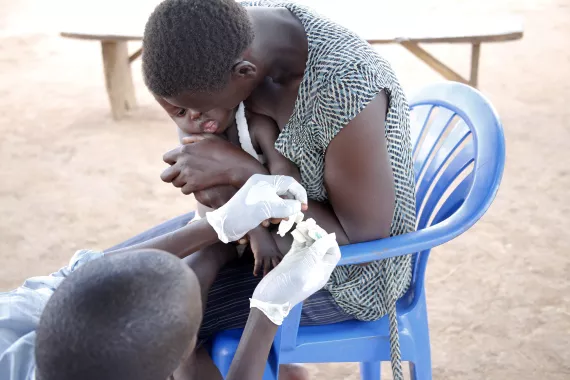Cerebral malaria, a severe and brain-targeting form of malaria, remains one of Uganda’s deadliest health threats, particularly for young children. It strikes with alarming speed and often leaves survivors with lifelong complications.
Uganda experiences between 12 and 16 million malaria cases each year, placing it among the most affected countries globally. The disease is transmitted through the bite of the female Anopheles mosquito. Symptoms usually appear 9 to 16 days after infection and may include fever, weakness, vomiting, and diarrhea symptoms that are especially dangerous in children under five.
Malaria can develop rapidly after the onset of fever. Within 24 to 48 hours, particularly in children and pregnant women, severe forms of the disease may emerge. Once in the body, the malaria parasite destroys red blood cells, leading to anemia that may require blood transfusions. In some cases, the parasite clogs blood vessels in the lungs, causing breathing difficulties.
In its most dangerous form, cerebral malaria, the parasite binds to blood vessels in the brain or kidneys. This can trigger convulsions, which may quickly progress to coma. The onset can be alarmingly fast sometimes within just 48 hours of the first fever. Without immediate and effective treatment, the condition can be fatal. Even with medical intervention, cerebral malaria carries a fatality rate of around 20%.
Diagnosis is typically made when a patient, most often a child, falls into a coma and tests positive for malaria parasites. Because the disease progresses so quickly, timely diagnosis is critical. Parents and caregivers are urged never to delay treatment for a fever in a child; seeking medical attention within the first day of symptoms can be the difference between life and death.
However, surviving cerebral malaria does not always mean a full recovery. Approximately 10% of children who survive develop epilepsy, while another 10–15% experience long-term effects such as psychological disorders, motor impairment, behavioral changes, and learning difficulties. These aftereffects can have a profound impact on a child’s education, social development, and future opportunities.
Efforts to combat cerebral malaria in Uganda include early diagnosis, prompt treatment, and preventive measures such as the use of insecticide-treated mosquito nets and indoor residual spraying. Public health campaigns continue to stress the importance of recognizing malaria symptoms early and seeking immediate medical care, especially for children and pregnant women.
Cerebral malaria’s speed and severity make it one of the most urgent public health challenges in Uganda today one that requires vigilance, awareness, and swift action to save young lives.

